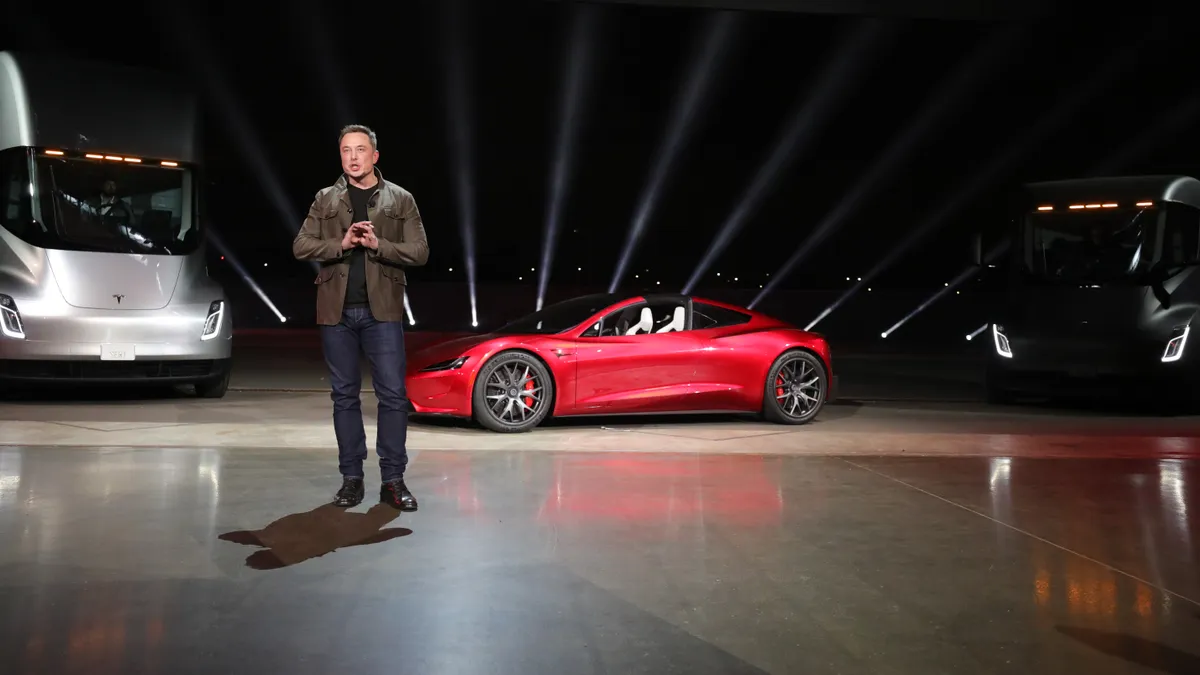Dive Brief:
- Tesla is sticking to its plan to deliver its first Semi by the end of the year, but it "would not make sense" for the OEM to put it into full production, CEO Elon Musk said on the company's Q4 earnings call.
- "We could easily go into production with the Semi, but we would not have enough cells built for it right now," Musk said. The company cited production slowdowns due to battery constraints one year go, a few months before postponing the first Semi delivery until 2021.
- A Semi would typically use five times the number of cells a Tesla car would, but the Semi would not sell for five times the price of a car, Musk said. The expected base price of a Tesla Semi with 500-mile range is $180,000. Musk and his company remain "extremely confident" that they can bring a battery-electric, long-range truck to market, eventually, he said.
Dive Insight:
Tesla's battery constraints appear to have not improved over the last calendar year. In Q3 2020, Musk told investors that the company needed more battery cells before ramping up production of the Semi. In the previous quarter, the CEO declined to comment directly but noted the need for more nickle to build batteries.
Even considering the battery issues, Musk maintains the technology makes more sense than hydrogen for the Semi.
"People were saying that, somehow, hydrogen is going to be a better means of energy storage in a car than batteries. And it was like, this is just really not the case," he said.
Hydrogen "is not realistic" to keep in liquid form, Musk said. Developing it into a fuel cells adds complications, he said. "It's just crazy, basically."
Toyota, Navistar and Nikola are part of the OEM contingency betting on hydrogen. Infrastructure is often cited as the biggest barrier to widespread deployment of fuel-cell-electric vehicles. Toyota and Hino Motors partnered last year to get fuel-cell-powered prototypes on the streets of Japan. Cummins and Navistar announced last November they would produce a Class 8 hydrogen truck that Werner would test for regional hauls in California.
Nikola recently reached a deal with an Arizona utility company to generate hydrogen at a future fueling station, enabling Nikola's plans for a freight corridor along I-10.
"Despite issues with the efficiency of hydrogen as a fuel, FCEV remains in the conversation as a technology for long haul trucking applications, where a greater range is required, though the viability of this technology is dependent on the production [of] cheap low carbon hydrogen," according to a report from IDTechEx.
Another concern with battery-electric trucks is weight. Current battery technology is generally heavy, which cuts into payload. But Musk said "the math works out," and it's possible to develop a battery conducive to a 500-mile range with minimal effect on payload.
"And we see also an increase on the regionalization of trucks. And I think it will be perfect. The Tesla Semi will be perfect for it," Jerome Guillen, Tesla's president of automotive, said during the call, adding that he looks forward to having more Semis "on the road very soon."
Eventually, those Semis could drive themselves. Musk said he thinks it is "quite likely" that the vehicle might be the first to achieve full autonomy. The autonomy technology would be the same found on Tesla's cars; some parameters would need to be changed to integrate with trucking operations.
"You have ... different control functions, because there are turns that you could do in a regular car that you cannot do in a Semi," Musk said. "It needs to know its limitations, being a giant truck."












